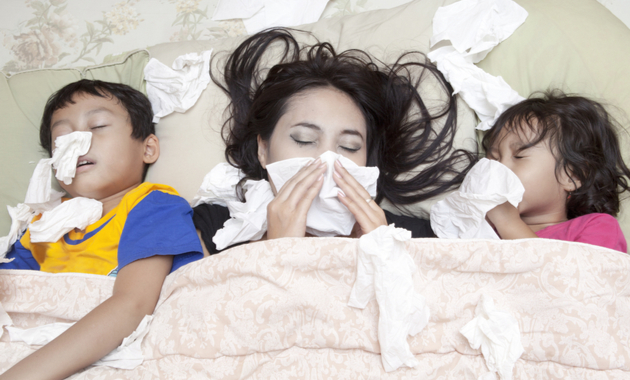
Seasonal flu or influenza can occur all around the year, however, it is quite common during change of the season. Influenza is caused by viruses which attack the respiratory system and trigger the immune system to produce antibodies to fight the virus. This, in turn, shows symptoms such as a cough, cold, sore throat, fever, and body ache. Most people who become sick usually get well within a few days to less than two weeks. However, in some cases, it can cause severe health complications such as infection in the lungs (pneumonia), inflammation of the heart (myocarditis), brain (encephalitis) and multi-organ failure. So to help you get a clear understanding about flu and its vaccination, we have answered some of the commonly asked questions on influenza.
Frequently Asked Questions About Seasonal Flu
1. Why do we get colds and flu in winter?
Flu is caused by the influenza virus and not the cold weather. However, it is believed that colds and the flu peak in the winter which is attributed to the cold. There are numerous theories that explain why flu is common in winters. As people spend more time indoors during the winter, it causes them to breathe the same air as someone suffering from flu, causing you to contract the virus.
Also, the lack of sunlight could also be a contributing factor as it leads to low levels of Vitamin D, which can compromise the immune system. This, in turn, can decrease your ability to fight the virus and make you more prone to infection. According to a 2011 study published in the journal Environmental Health Perspectives[1], the influenza virus may survive better in cold and dry climate, which can explain why the cases of flu increase in winters.
2. What is the first sign/symptom of the flu?
Flu is different from a cold. It usually comes on suddenly and people who are down with flu might experience some or all of the symptoms which include fever/chills, cough, sore throat, runny or stuffy nose, muscle or body aches, headaches, and fatigue (tiredness).
3. When should you go to a doctor if you have the flu?
Just like any other disease or infection, when you experience any of the symptoms of flu, you should consult a doctor. Also, if your symptoms do not go away quickly, make an appointment with a doctor as not treating the condition might lead to severe health complications including pneumonia.
**Consult India’s best doctors here**
4. How long should you stay home when you have the flu?
A common question that most people ask their doctors is how long should they stay away from work or school when down with flu. Well, the answer to this question is as long as you feel sick. Moreover, it is important to stay at home when you are most contagious which is usually about a week after you start experiencing symptoms. If you have a cold, it is advised to not go out till the time you have symptoms.
5. Is there any truth to the old saying “Feed a cold; starve a fever”?
Most of us might have heard this common saying that one should feed a person suffering from cold and starve a person who is down with a fever. However, there is no explanation for the same. Experts believe that when you have flu or fever, you should eat healthy and drink lots of fluids. There is no need to eat more or less than usual. Although you might have less appetite when suffering from fever or flu, starving or overeating might not help. So ensure to eat a balanced diet rich in nutrients to help you get well soon.
How To Get Rid Of Cold & Cough? The Right Stuff Is Here. Click Now.
6. Who should get the flu shot/vaccine?
Anyone can get sick with flu which includes healthy people as well and hence, it is recommended that everyone should get the flu vaccine. However, there are a certain group of people who are at a high risk of suffering from flu and developing flu-related complications when infected with the virus. Hence, these people must get a flu shot without fail. This includes people above 65 years of age, those suffering from chronic health problems such as asthma, diabetes and heart disease, pregnant women and children younger than five years of age.
(The article is reviewed by Dr. Lalit Kanodia, General Physician)
Recommended Reads:
7 Simple Tips To Prevent Seasonal Flu
14 Best Natural Immunity Boosters For Cold And Flu This Winter
References:
1. Tamerius J, Nelson MI, Zhou SZ, et al. Global influenza seasonality: reconciling patterns across temperate and tropical regions. Environ Health Perspect. 2011 Apr;119(4):439-45.
2. Key Facts About Seasonal Flu Vaccine. Prevent Flu. Seasonal Influenza (Flu). The Centres for Disease Control and Prevention.
3. Seasonal Flu. The Centres for Disease Control and Prevention.